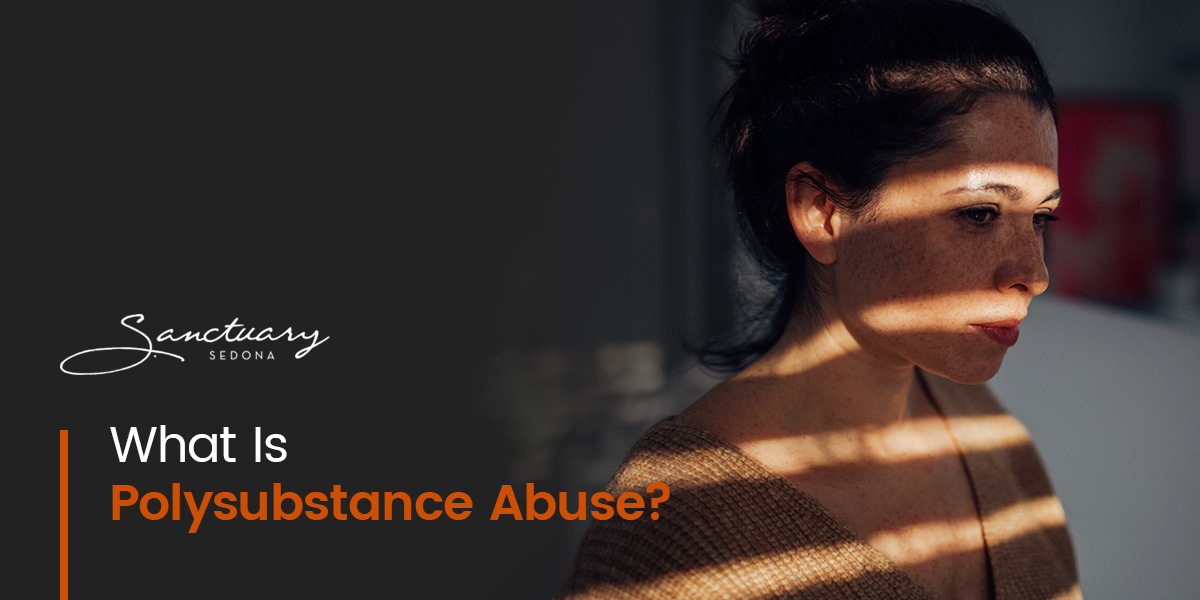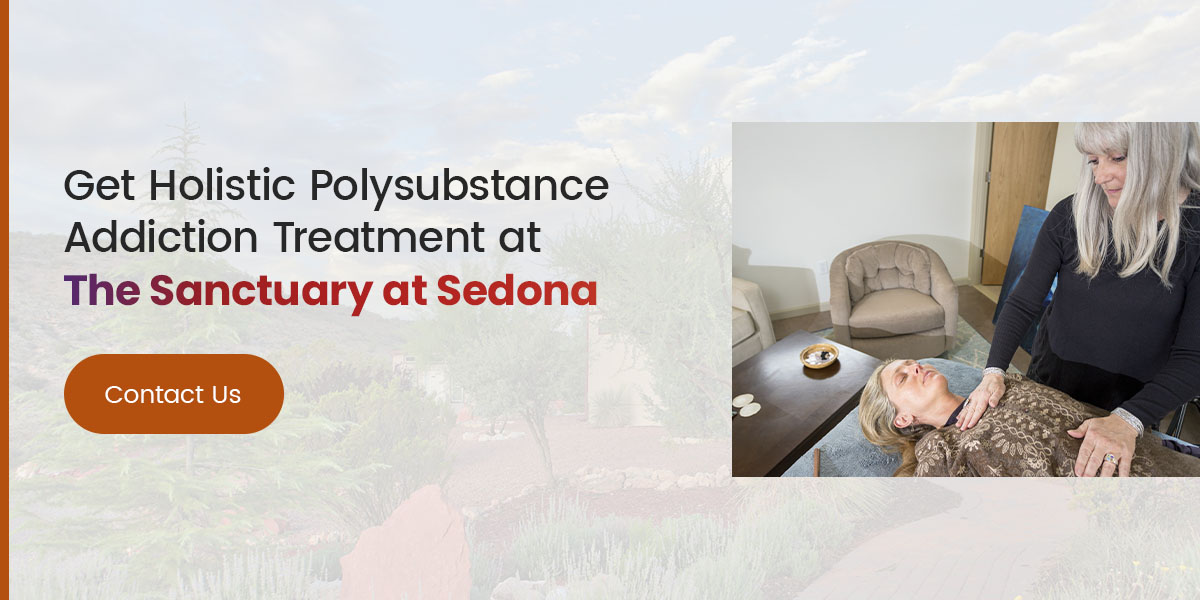Polysubstance misuse is when someone becomes addicted to more than one illicit or prescription substance. It can occur by unintentionally combining prescription medications or by mixing illegal substances to get more intense effects. Either way, combined drug intoxication can cause harmful and potentially fatal side effects, increasing a person’s risk of addiction and overdose.
Fortunately, a holistic and individualized treatment plan can help you safely detox and begin a healthier, happier life free from substance use. Continue reading to learn more about the signs and dangers of polysubstance misuse and how to get help.
Signs of Polysubstance Use
Signs and symptoms of polysubstance use can be challenging to recognize in the early stages and will vary depending on the person. Still, you might note these psychological, behavioral and physical health changes that indicate a deeper problem:
Behavioral Changes
Addiction is a brain disorder that can make people feel like they cannot survive without substances. As a result, they may do things completely out of character to sustain their addiction. The condition can also place immense stress on the brain and body, causing exhaustion and a lack of motivation to do anything but seek out and take substances. Watch for behavioral changes in a loved one like:
- Losing interest in hobbies and activities
- Neglecting personal and professional responsibilities
- Difficulty maintaining relationships
- Engaging in substance-seeking behavior
- Withdrawing from friends and family
- Asking for money or selling valuables
- Increased risk-taking, such as driving under the influence
- Lying or difficulty keeping promises

One of the most significant behavioral changes can be isolation. You might notice your loved one withdrawing from friends and family. They will often do this to protect their privacy out of fear of rejection and may become distrustful of others.
Psychological Impacts
Polysubstance addiction can significantly alter brain chemistry. Substance use affects motivation and our brain’s reward circuitry, causing euphoria in the initial stages of addiction while diminishing sensitivity over time so the individual doesn’t feel pleasure from anything besides that substance.
Watch for the following psychological signs of polysubstance addiction in a loved one:
- Mood swings
- Irritability and anger
- Aggression
- Anxiety
- Depression
Addiction also impacts the brain region responsible for anxiety, irritability and unease. These symptoms often accompany withdrawal, thus motivating a person to seek the drug again. Polysubstance addiction can also alter how a person thinks, plans, solves problems and makes decisions. Therefore, substance use can make a person more prone to impulsive decisions.
Physical Health Effects
Polysubstance addiction can significantly impact a person’s overall physical health. While it can lead to long-term complications, you might also notice visible combined drug intoxication symptoms like:
- Slurred speech
- Droopy eyelids
- Body pain
- Lack of coordination
- Bloodshot eyes
- Dilated pupils
- Changes in heart rate
- Changes in respiratory rate
- Jaw clenching
- Changes in blood pressure
Tolerance is another physical effect of substance use, which causes a person to require more substances to achieve the initial effects. This can lead to polysubstance dependence over time, increasing a person’s risk of health complications.
Dangers of Polysubstance Use
Polysubstance abuse often has lasting impacts. Potential long-term effects of polysubstance addiction include:
Health Problems
Drug interactions can reduce a person’s metabolism and increase the blood concentrations of the specific substances in the body. Ultimately, it boosts toxicity and produces new metabolites as the body attempts to break down multiple substances. The resulting health problems can be short or long-term. Chronic diseases can include hepatitis C, myocardial infarction and others, depending on the substances taken. Mixing substances can also cause damage to vital organs like the liver and brain, causing health complications like heart attack, brain injury, seizures or stroke.
Increased Severity of Side Effects
All substances come with the potential for adverse side effects. When combined, the severity of these symptoms can increase exponentially. Whether intentionally or not, mixing substances can lead to stronger and more unpredictable effects than one substance alone and can even be deadly.
Mental Health Complications
Those who have co-occurring conditions like anxiety and depression might be more likely to engage in polysubstance misuse. Substance use can worsen the symptoms of a mental health condition and vice versa, amplifying the effects when taking multiple drugs at once. Symptoms can also occur when taking substances alongside prescription medications for mental health conditions.
Overdose
While there is always the potential for overdose with any substance misuse, the risk increases when misusing multiple substances. Specific drugs can mask the effects of others, causing a person to accidentally take a higher dose than usual. This can lead to overdose and long-term health effects. Signs of overdose can include a pale or clammy face, vomiting, purple or blue nails, slow heartbeat and slow breathing. If you suspect someone is experiencing an opioid overdose, immediately contact emergency medical services.
Polysubstance Addiction Treatment
Polysubstance use disorder is a type of addiction that generally requires a more specialized approach to recover fully. Through a holistic, comprehensive treatment plan, you can benefit from services like:
- Detoxification: The first step in treating polysubstance addiction requires medical detox. You should only undergo detox with the help of professionals trained in managing polysubstance withdrawal, as symptoms can include unpredictable health effects and risks. Professionals can help you through the withdrawal process in the safest, most comfortable way possible.
- Psychotherapy: In evidence-based therapies like cognitive behavioral therapy (CBT), you will begin the process of discovering underlying issues that might have contributed to your addiction. Therapists can help you learn coping skills to combat relapse and start a healthier, happier lifestyle.
- Group therapy sessions: In group therapy, you’ll learn from people with similar experiences. You can strengthen each other’s motivation and provide support and encouragement through treatment.
- Holistic therapies: Holistic therapies can enhance your treatment programs through various relaxation techniques and experiential activities. These include meditation, yoga, mindfulness acupuncture and art therapy.
With the support and guidance of a professional treatment program, it is possible to overcome a polysubstance use disorder.
Get Holistic Polysubstance Addiction Treatment at Sanctuary at Sedona
Polysubstance addiction can have lasting psychological, physical and social implications. Fortunately, addiction is a treatable condition. Polysubstance addiction treatment requires a professional, structured approach. At The Sanctuary at Sedona, we provide an integrative holistic treatment program that offers the structure you need to make positive changes in your life and reach a place free from substances.
You’ll have access to a compassionate and qualified medical team who can provide safe detox, evidence-based therapies to help you recover, nutrition guides and other care professionals who can help you restore health and wellness.
To get started, contact us today.
He is the Founder, Administrator, Counselor at the Sanctuary at Sedona. He has a BA in Political Science and is currently Senior teaching staff at Four Winds Society, an international school of energy medicine. His credentials also include being an Ordained Minister; a Certified Shamanic Breathwork® Facilitator; a Founding Member Society for Shamanic Practitioners; a Member of Association for Comprehensive Energy Psychology; a Member of the National Institute for Holistic Addiction Studies. [email protected]


